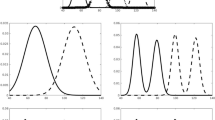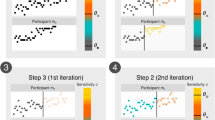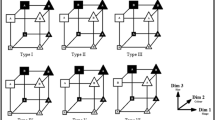Abstract
We use a feature-based association model to fit grouped and individual level category learning and transfer data. The model assumes that people use corrective feedback to learn individual feature to categorization-criterion correlations and combine those correlations additively to produce classifications. The model is an Adaptive Linear Filter (ALF) with logistic output function and Least Mean Squares learning algorithm. Categorization probabilities are computed by a logistic function. Our data span over 31 published data sets. Both at grouped and individual level analysis levels, the model performs remarkably well, accounting for large amounts of available variances. When fitted to grouped data, it outperforms alternative models. When fitted to individual level data, it is able to capture learning and transfer performance with high explained variances. Notably, the model achieves its fits with a very minimal number of free parameters. We discuss the ALF’s advantages as a model of procedural categorization, in terms of its simplicity, its ability to capture empirical trends and its ability to solve challenges to other associative models. In particular, we discuss why the model is not equivalent to a prototype model, as previously thought.






Similar content being viewed by others
References
Amari SI (1977) Neural theory of association and concept-formation. Biol Cybern 26:175–185. https://doi.org/10.1007/BF00365229
Ashby FG, Alfonso-Reese LA, Turken AU, Waldron EM (1998) A neuropsychological theory of multiple systems in category learning. Psychol Rev 105(3):442–481. https://doi.org/10.1037/0033-295X.105.3.442
Ashby FG, Ennis JM (2006) The role of the basal ganglia in category learning. Psychol Learn Motiv 46:1–36. https://doi.org/10.1016/S0079-7421(06)46001-1
Ashby FG, Ell SW, Waldron EM (2003) Procedural learning in perceptual categorization. Mem Cognit 31(7):1114–1125. https://doi.org/10.3758/BF03196132
Ashby FG, Maddox WT (1993) Relations between prototype, exemplar, and decision bound models of categorization. J Math Psychol 37(3):372–400. https://doi.org/10.1006/jmps.1993.1023
Ashby FG, Maddox WT (2005) Human category learning. Annu Rev Psychol 56(1):149–178. https://doi.org/10.1146/annurev.psych.56.091103.070217
Ashby FG, Maddox WT, Lee WW (1994) On the dangers of averaging across subjects when using multidimensional scaling or the similarity-choice model. Psychol Sci 5(3):144–151. https://doi.org/10.1111/j.1467-9280.1994.tb00651.x
Ashby FG, Valentin VV (2018) The categorization experiment: experimental design and data analysis In: Wixted, J T (4th Ed.), Stevens handbook of experimental psychology and cognitive neuroscience, Volume Five Methodology New York: Wiley pp. 307-333
Blair M, Homa D (2003) As easy to memorize as they are to classify: the 5–4 categories and the category advantage. Mem Cognit 31(8):1293–1301. https://doi.org/10.3758/BF03195812
Bowman CR, Zeithamova D (2020) Training set coherence and set size effects on concept generalization and recognition. J Exp Psychol Learn Mem Cogn 46(8):1442–1464. https://doi.org/10.1037/xlm0000824
Bozoki A, Grossman M, Smith EE (2006) Can patients with Alzheimer’s disease learn a category implicitly? Neuropsychologia 44:816–827
Clapper JP, Bower GH (2002) Adaptive categorization in unsupervised learning. J Exp Psychol Learn Mem Cogn 28(5):908–923
Cohen AL, Nosofsky RM, Zaki SR (2001) Category variability, exemplar similarity, and perceptual classification. Mem Cognit 29(8):1165–1175
Farrell S, Lewandowsky S (2018) Computational modeling of cognition and behavior. Cambridge University Press, UK
Gluck MA, Bower GH (1988) From conditioning to category learning: an adaptive network model. J Exp Psychol Gen 117(3):227–247. https://doi.org/10.1037/0096-3445.117.3.227
Hampton JA (1979) Polymorphous concepts in semantic memory. J Verbal Learning Verbal Behav 461:441–461
Johansen MK, Kruschke JK (2005) Category representation for classification and feature inference. J Exp Psychol Learn Mem Cogn 31(6):1433–1458. https://doi.org/10.1037/0278-7393.31.6.1433
Kéri S, Kálmán J, Kelemen O, Benedek G, Janka Z (2001) Are alzheimer’s disease patients able to learn visual prototypes? Neuropsychologia 39:1218–1223
Kruschke JK (1992) ALCOVE: an exemplar-based connectionist model of category learning. Psychol Rev 99(1):22–44. https://doi.org/10.1037/0033-295X.99.1.22
Kruschke JK, Johansen MK (1999) A model of probabilistic category learning. J Exp Psychol Learn Mem Cogn 25(5):1083–1119. https://doi.org/10.1037/0278-7393.25.5.1083
Lee MD, Navarro DJ (2002) Extending the ALCOVE model of category learning to featural stimulus domains. Psychon Bull Rev 9:43–58. https://doi.org/10.3758/BF03196256
Little DM, Thulborn KR (2006) Prototype-distortion category learning: a two-phase learning process across a distributed network. Brain Cogn 60(3):233–243. https://doi.org/10.1016/j.bandc.2005.06.004
Maddox WT, Ashby FG (2004) Dissociating explicit and procedural-learning based systems of perceptual category learning. Behav Proc 66(3):309–332. https://doi.org/10.1016/j.beproc.2004.03.011
Markman AB, Ross BH (2003) Category use and category learning. Psychol Bull 129(4):592–613. https://doi.org/10.1037/0033-2909.129.4.592
Medin DL, Schaffer MM (1978) Context theory of classification learning. Psychol Rev 85:207–238
Minda JP, Smith JD (2002) Comparing prototype-based and exemplar-based accounts of category learning and attentional allocation. J Exp Psychol Learn Mem Cogn 28(2):275–292. https://doi.org/10.1037/0278-7393.28.2.275
Murphy GL (2002) The big book of concepts. MIT Press, Cambridge, Mass
Nosofsky RM (1984) Choice, similarity, and the context theory of classification. J Exp Psychol Learn Mem Cogn 10(1):104–114. https://doi.org/10.1037/0278-7393.10.1.104
Nosofsky RM (1986) Attention, similarity, and the identification–categorization relationship. J Exp Psychol Gen 115(1):39–57. https://doi.org/10.1037/0096-3445.115.1.39
Nosofsky RM (1989) Further tests of an exemplar-similarity approach to relating identification and categorization. Percept Psychophys 45(4):279–290. https://doi.org/10.3758/BF03204942
Nosofsky RM (1992) Exemplars, prototypes, and similarity rules. In Healy, AF, Kosslyn, SM, & Shiffrin, RM (1992). From learning theory to connectionist theory: essays in honor of William K. Estes. New Jersey: Lawrence Erlbaum Associates
Nosofsky RM (2011) The generalized context model: an exemplar model of classification. In: Pothos EM, Wills AJ (eds) Formal approaches in categorization. Cambridge University Press, Cambridge, pp 18–39. https://doi.org/10.1017/CBO9780511921322.002
Nosofsky RM, Kruschke JK, McKinley SC (1992) Combining exemplar-based category representations and connectionist learning rules. J Exp Psychol Learn Mem Cogn 18(2):211–233
Nosofsky RM, Zaki SR (2002) Exemplar and prototype models revisited: response strategies, selective attention, and stimulus generalization. J Exp Psychol Learn Mem Cogn 28(5):924–940. https://doi.org/10.1037/0278-7393.28.5.924
Posner MI, Keele SW (1968) On the Genesis of abstract ideas. J Exp Psychol 77:353–363. https://doi.org/10.1037/h0025953
Reed SK (1972) Pattern recognition and categorization. Cogn Psychol 3(3):382–407. https://doi.org/10.1016/0010-0285(72)90014-X
Reed JM, Squire LR, Patalano AL, Smith EE, Jonides J (1999) Learning about categories that are defined by object-like stimuli despite impaired declarative memory. Behav Neurosci 113:411–419
Roeder JL, Ashby FG (2016) What is automatized during perceptual categorization? Cognition 154:22–33. https://doi.org/10.1016/j.cognition.2016.04.005
Smith JD, Minda JP (1999) Prototypes in the mist: the early epochs of category learning: correction to smith and minda (1998). J Exp Psychol Learn Mem Cogn 25(1):69–69. https://doi.org/10.1037/h0090333
Smith DJ, Minda JP (2000) Thirty categorization results in search of a model. J Exp Psychol Learn Mem Cogn 26(1):3–27. https://doi.org/10.1037/0278-7393.26.1.3
Widrow B, Hoff ME (1960) Adaptive switching circuits. Inst Radio Eng, West Electron Show Conv, Conv Rec 4:96–194
Widrow B, Kamenetsky M (2003) Statistical efficiency of adaptive algorithms. Neural Netw 16(5–6):735–744
Wills AJ, Ellett L, Milton F, Croft G, Beesley T (2020) A dimensional summation account of polymorphous category learning. Learn Behav 48(1):66–83. https://doi.org/10.3758/s13420-020-00409-6
Worthy DA, Markman AB, Todd Maddox W (2013) Feedback and stimulus-offset timing effects in perceptual category learning. Brain Cogn 81(2):283–293. https://doi.org/10.1016/j.bandc.2012.11.006
Zeithamova D, Maddox WT, Schnyer DM (2008) Dissociable prototype learning systems: evidence from brain imaging and behavior. J Neurosci 28(49):13194–13201. https://doi.org/10.1523/JNEUROSCI.2915-08.2008
Funding
The current work was supported by ANID Fondecyt grant 1190006 to the third author and by a graduate scholarship from Universidad Adolfo Ibáñez to the first author.
Author information
Authors and Affiliations
Corresponding author
Ethics declarations
Conflict of interest
The authors declare that they have no conflict of interest.
Human or animal rights
This article does not contain any studies with human participants or animals performed by any of the authors.
Additional information
Publisher's Note
Springer Nature remains neutral with regard to jurisdictional claims in published maps and institutional affiliations.
Handling editor: Moreno Cocco (East London University), Antonio Calcagni (University of Padova); Reviewers: a researcher who prefers to remain anonymous.
Supplementary Information
Below is the link to the electronic supplementary material.
Rights and permissions
About this article
Cite this article
Marchant, N., Canessa, E. & Chaigneau, S.E. An adaptive linear filter model of procedural category learning. Cogn Process 23, 393–405 (2022). https://doi.org/10.1007/s10339-022-01094-1
Received:
Accepted:
Published:
Issue Date:
DOI: https://doi.org/10.1007/s10339-022-01094-1




